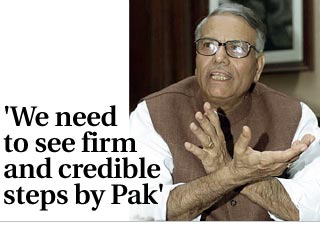
External Affairs Minister Yashwant Sinha believes Pakistan has to end infiltration before any long term solution can be discussed about Kashmir. Emphasing the need for improving Indo-Pak bilateral relations for the success of the latest peace initiative, Sinha reiterated that the entire state of Jammu and Kashmir belonged to India.
In a wide ranging e-mail interview with Senior Editor Ramananda Sengupta, he said India's policy of restraint coupled with a credible deterrent had had a positive impact on stability in Asia and beyond, and that the Indian nuclear doctrine talks of massive retaliation was "designed to inflict unacceptable damage."
The prime minister's peace initiative has been widely welcomed. But what has changed on the ground for the belief that the next summit will not go the Lahore and Agra way?
In his May 3 reply to the letter from the Pakistan prime minister, our prime minister had emphasised the need to prepare the ground step by step, so that there could be a meaningful engagement at the highest level without the risk of failure.
We need to take measures to generate a momentum for improvement in our bilateral relations. These include economic cooperation, cultural exchanges, and people-to-people contacts.
We also need to see firm and credible steps by Pakistan to end cross-border infiltration and terrorism, and to dismantle the infrastructure of support to terrorism in that country. Otherwise, the atmosphere can be vitiated, and the attempts derailed at any stage. This is the only way to ensure success.
Is there any significance to the fact that the Pakistani response to Mr Vajpayee's initiative comes from Pakistan Prime Minister Zafarullah Khan Jamali and not President Pervez Musharraf? Does India see Jamali as the representative of the Pakistan government?
There is a dilemma and contradiction inherent in the fact that General Musharraf, even though he is the president, is also the army chief. This is, however, a matter for Pakistan to resolve.
In the past Indian prime ministers had interacted with prime ministers [Mohammad Khan] Junejo, Nawaz Sharif and Benazir Bhutto.
Under what conditions, if at all, would India be amenable for dividing Kashmir formally along the Line of Control, and accept it as the international border?
The Constitution of India as well as the Resolution adopted in Parliament in 1994 clearly lay down that the entire state of Jammu and Kashmir is an integral part of India.
What, in your view, could provide a long term solution to the Kashmir problem?
A long-term solution to the Kashmir issue can be found once Pakistan abandons its adversarial approach, dissociates from sponsorship of terrorism, violence and armed irregulars, and works for a final settlement as provided for in the Simla Agreement between the two countries.
In this unipolar world, India can at best be a regional player. Your comments.
Globalisation has forever altered the basic tenets of international relations, especially concepts like unipolarity and regionalism.
India remains committed to the principles of multi-polarity and multilateralism in international affairs, which envisages a scenario of 'global inter-dependence' and mutual respect for each other's sovereignty. We view the conduct of foreign relations as a dynamic exercise and India's foreign policy aims at a forward looking engagement with the whole world.
The role India will play in the world will depend in the ultimate analysis, on the national strength she is able to build and the unity and coherence that her society and polity demonstrates in the times to come.
After becoming a nuclear power, has India become a more secure nation? How?
The exercise of the nuclear weapon option by India unmasked potentially dangerous ambiguities in our security environment aggravated by clandestine nuclear and missile proliferation. Our nuclear doctrine rests on a credible minimum deterrent, a policy of no first use of nuclear weapons and a unilateral moratorium on nuclear explosive tests.
These actions strengthen India's strategic autonomy and our security. We believe that our policies of restraint coupled with a credible deterrent have had a positive impact on stability in our neighbourhood in Asia and beyond.
Given India's conventional superiority, did the nuclear tests of 1998 actually level the battlefield between India and Pakistan?
Nuclear weapons constitute a deterrent, they are not weapons of war. Mixing them up with conventional military warfare can be a dangerous delusion. Our nuclear deterrent is purely defensive.
India's nuclear doctrine pledges no first use, yet stresses that it can react with a nuclear strike even in cases of biological or chemical weapons attacks by an adversary. How do you explain this contradiction?
Our nuclear doctrine seeks to safeguard India and Indian forces anywhere from use, by an adversary, of weapons of mass destruction.
The explanation that India's nuclear doctrine is not Pakistan specific is used to reject Pakistan's call for elimination of nuclear weapons by both sides. Who are the other adversaries?
India has always rejected calls for de-nuclearisation limited to a region or sub-region because nuclear weapons have a global reach. The aim of elimination of nuclear weapons should be pursued in a global forum with participation of all nuclear weapon states. The question about adversaries should be posed to every nuclear weapon state, not to India alone.
How much time will it take for India to respond to a nuclear strike, given that the warheads and the delivery systems are kept separately and need to be mated before launch?
Those planning our security have taken all factors into account. The Indian Nuclear doctrine talks of massive retaliation 'designed to inflict unacceptable damage.'





